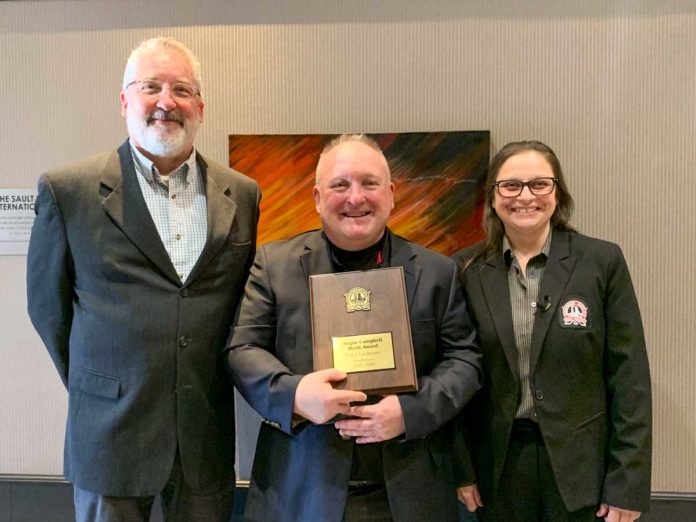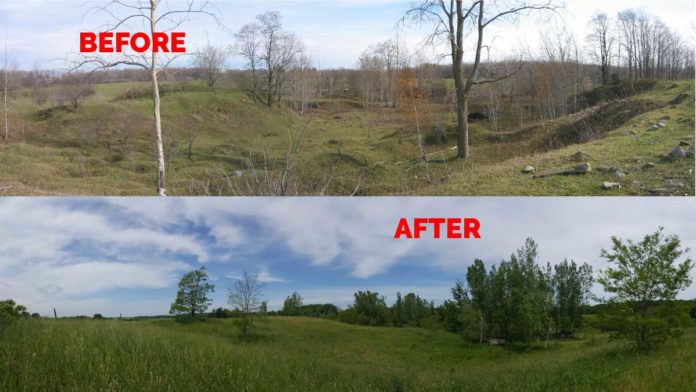French review board sides with developers over museum’s objections to sharing access road
NIPISSING—On D-Day, June 6, 1944, 14,000 Canadian soldiers waded onto the Normandy beach in France designated as Juno, braving withering fire from the Nazi defenders to secure a bridgehead that would eventually lead to the liberation of Europe from fascist domination. Recently, a French development company has been waging a court battle seeking to develop the valuable real estate for profit. The development company plans to build 70 condominium units, Domaine des Dunes, receiving a construction permit from local authorities in Courseulles-sur-Mer in February 2019. The two four-storey buildings are to go up just metres from Juno Beach.
Manitoulin’s last Second World War veteran, Justin Roy, who was in the second wave to land on Juno Beach on that fateful day was surprised to learn of the plans when contacted at his Arizona home by The Expositor.
“I think they should respect the beach,” said the 97-year-old veteran. “I lost a lot of buddies on that beach. We were all 17- to 20-year-olds. A lot of them never made it back.”
Mr. Roy did make it back, but he spent the rest of his life struggling with the impact of those horrific days fighting to free France and the world from under the iron boots of the Nazi German regime.
“I have had to stay busy all my life,” said Mr. Roy. “If I stopped to think, if I didn’t keep my mind active, things got very bad for me.”
Mr. Roy dealt with the post-traumatic stress disorder (PTSD) that he brought home as a D-Day souvenir.
“I worked six, seven days a week,” he said. “I enjoyed working, but I didn’t make any money,” he laughed. “I had no education, I dropped out of school by Grade 4.” As an Indigenous child growing up in Canada in the pre-war years, Mr. Roy is a residential school survivor. “I was lucky I got out,” he said. “But I had to go to work. There were no food stamps back then—if you didn’t work, you didn’t eat.”
It was that desire to keep eating that led him to travel into the US following his wartime service. That was where he could find work, he said.
Although he has since made his home in the US, Mr. Roy tries to return home to M’Chigeeng Firs Nation each summer. The pandemic upset that rhythm, but he hopes to come up this summer.
Like many of the handful of remaining veterans, Mr. Roy is now suffering from the impacts of great age.
“I am starting to lose my memory,” he said. “I forget things now.”
But that has not stopped the veteran from staying active.
“I just got back from a veterans’ trip to Washington,” he said. “We flew into Baltimore and got on a bus to go into Washington.” That trip included visits to the White House and other historic US monuments, but the most poignant was the stop at Arlington Cemetery—America’s premier veterans’ burial ground. He was joined on the trip by other Second World War veterans, but they made a sparse crew. The trip included around 100 veterans from different countries that participated in the last world war.
“I don’t think there are many more than 12 of us left from D-Day,” he said.
Many fell in those hellish days. “We walked 15 to 20 feet apart,” he said. “We never bunched up in a group, but we supported each other.”
Mr. Roy’s dismay at the development plans for Juno Beach is not alone.
The Anishinabek Nation, representing 39 Ontario First Nations, has added their voice to the Royal Canadian Legion and the Canadian government in opposing the development.
“We must consider the impacts this development will have on the fallen veterans, their families and the shared historic significance this site has to both of our nations,” said Anishinabek Nation Grand Council Chief Reg Niganobe following the Anishinabek Nation council decision to make their opposition to the proposed development known. “To our people, we consider that a sacred area,” he said. “It is unfortunate they are doing development in that area.”
“The grounds at Juno Beach in France are sacred and revered,” said Legion Dominion President Bruce Julian in a press release. “They are where Canadian and allied soldiers fought and died during the Second World War and people from near and far visit this tranquil setting to pay respects. This was the site of a pivotal world conflict—which led to our freedoms today.”
The Canadian government has also thrown its support behind groups like the Save Juno Beach campaign to stop construction. “We welcome the incredible outpouring of public support for the Juno Beach Centre—including that of the Anishinabek Nation—that the proposed condominium development has prompted,” reads a statement from Veterans Affairs Canada, while earlier this month Veterans Affairs Minister Lawrence MacAulay led a delegation to the Juno Beach Centre to meet with French officials. Minister MacAulay vowed to do “everything possible” to resolve the dispute.
The court battle over development has been raging for two years, but a French court ruling in January granted developer Foncim the right to begin construction on a 70-unit residential development later this year on the battleground where 340 Canadian soldiers died.
The only road into the area was built and paid for by the privately-owned Juno Beach Museum and the court case centred on the developer’s demand to have access to that road. The museum contends that construction of the residential units would kill visitor traffic to the memorial.
While the museum has eschewed the moral implications of the proposed development, the Legion has not shied from that aspect.
“Disturbing the surroundings permanently with a housing complex would negatively affect the area in irreversible ways,” said the Legion president. “We implore those involved in this project to consider the physical and emotional damage it would create and choose an appropriate alternate location.”
“I made a little speech at the D-Day building at Arlington,” recalled Mr. Roy. “I couldn’t seem to get the words I wanted to say out—I kinda choked up.”
Mr. Roy said that he was very proud to represent all of the Indigenous people who served during World War II. “I felt sorry for those who didn’t make it,” he said. “About this development, I don’t know, they should respect the buddies that are gone.”
All hope is not lost even though the privately-owned Juno Beach Museum lost the court case challenging the permit in French courts after spending $400,000. A French citizen’s group, Les Amis du Centre Juno Beach and residents of Courseulles-sur-Mer have been vocal in their opposition to the project and the mayor who authorized the permit was voted out of office.
A website has been set up to raise awareness and support for this latest battle for Juno Beach: www.savejunobeach.ca.





